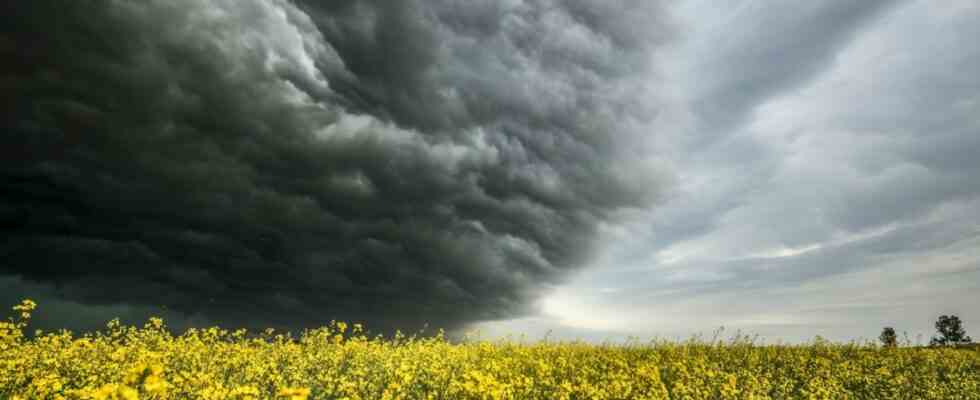Last year, Dirk von Petersdorff presented a new collection of his poems, in which a lot happens in front of weather backdrops, summer and winter backgrounds, that also applies to things that growing children do, and there it is particularly touching. The family is an integral part of Petersdorff’s poetry, and so it is in his new book.
Dirk von Petersdorff is a master mood maker, a poet who knows how to prepare for the looming catastrophe with gathering clouds and trees swaying in the wind. His new narrative work, a novella, is called “Storm Guests”, because Petersdorff, the neo-Germanist, loves to fall back on the forms of the classics, the rhyme in poetry, the thing poem and now the manageable story heading for a climax – you have to take the formal traditions don’t talk big.
“Storm Guests” is a story from our brittle days, surrounded by threats and unreasonable demands from all sides. Friedrich and his wife Jenny live in a town in eastern Germany. They moved here after reunification, soon becoming familiar with the idiosyncrasies of the locals and their skepticism about the West and its protagonists. At the same time, Jenny and Friedrich are self-critical enough not to draw enemy lines in the sand, because after all they moved here “to get to know a new region with different backgrounds,” as Jenny puts it. But everyday life is often difficult, in the kindergarten Jenny is the unfortunate “West-Mutti”, hostile looks meet her everywhere.
As a literary scholar, Dirk von Petersdorff holds a professorship for modern German literature in Jena. As an author he writes poetry and prose.
(Photo: Friedrich Schiller University Jena)
It’s summer, a critical summer in many ways. The climatic findings are right on the first page: brown patches of grass, weeks of drought, today’s summer. Jenny is preparing an evening party, she has invited a colleague from Brandenburg, Rolf, who had already introduced himself on the phone using questionable lateral thinker terminology. In addition, there is supposed to be a former girlfriend of Friedrich, Thea, and on top of all that, a lot of mischief is happening in the sky. Storm clouds gather, a drone launched by Paul, one of the two sons, crashes into a tree. Paul is also completely lost to the local legend of a former Red Army soldier who is said to be mourning a comrade who died during an NVA maneuver and who is haunting the area. Areas of conflict wherever you look, strangeness and nervousness, homelessness and attempts at appeasement – only the older son, Georg, is not alien to the East. He has his friends here, including the Syrian Aras, who is very familiar with the history of German emperors and is presented as a kind of integration original.
Dirk von Petersdorff: Thunderstorm guests. novella. CH Beck, Munich 2022. 124 pages, 20 euros.
What is brewing in the sky and the wind blowing through the door finds an atmospheric counterpart at the table as soon as Rolf and his wife Beate arrive. A nice trick is the conspiracy theory consideration that Germany would be completely defenseless in the event of a pandemic: “We have practically no protective masks,” says the angry Rolf. It is summer 2019. “Prohibition state”, “democracy”, the rhetorical armor does not give way, even after the arrival of Tine, who is flirting more and more openly with the former love affair with Friedrich.
It is amazing how skilfully Petersdorff stages his mentality-weather drama, in which almost everyone involved loses their location coordinates. Only Jenny insists on being in order: “This is my island, everything is fine here,” she said, but then a helicopter lands in the garden, the metaphors suddenly take shape, and at some point Jenny says the sentence that the reader had heard from the beginning on the tip of his tongue: “All hunches come true.” “Gewitter guests” is a virtuoso through-composed story that captures the verbal sound of the young people as well as the angry language of the supposedly neglected, which of course does not always escape the mannerist overdrive: “The smell of smoke from the nearby charcoal factory hung over the scene like mild nonsense. “
One should not reveal too much about the events, because Petersdorff has not only equipped his West/East German milieu play with carefully overheard quotations, but also with all kinds of strong motives and hints, all of which are redeemed in the plot. And on top of all that, Petersdorff lets his light and dark theater run, wind and dusk, rain and thunderstorms – there’s a bit too much of everything, but that’s not only due to the author, but certainly also to the state of the contemporary world.

